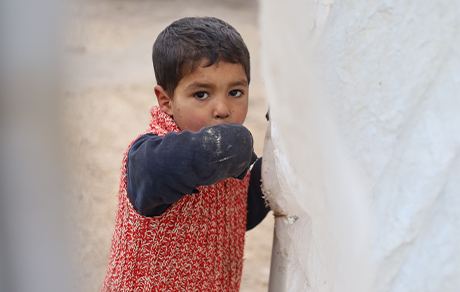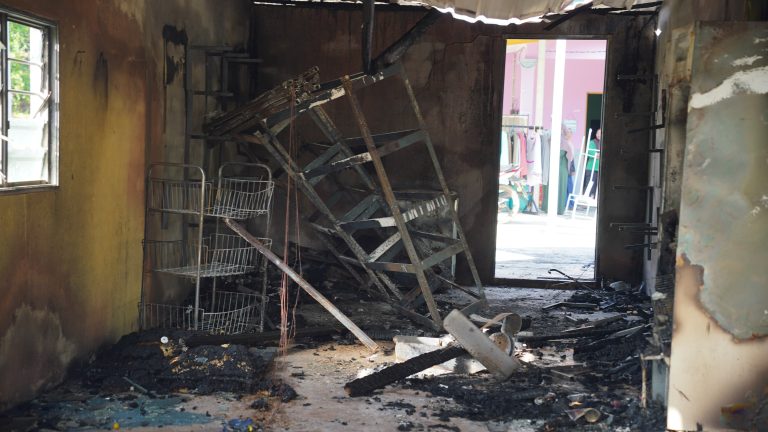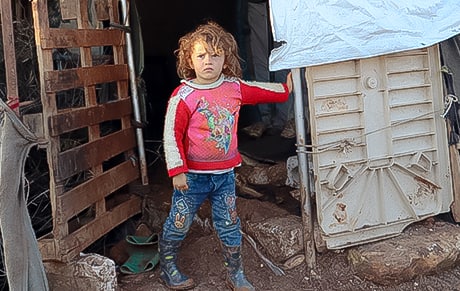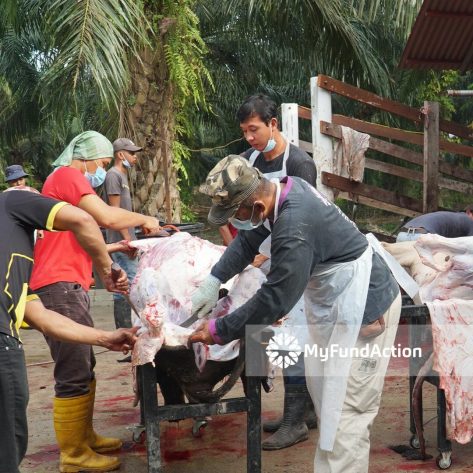
Qurban is an important Islamic tradition that involves sacrificing an animal, such as a cow, goat, or sheep, on the 10th day of Dhul Hijjah, the 12th month of the Islamic calendar. The meat from the qurban is then distributed to the poor and needy, as well as to family and friends.
However, the question that has arisen recently on social media is about the issue of the actual law for the provision of qurban meat to non-Muslims.
Table of Contents
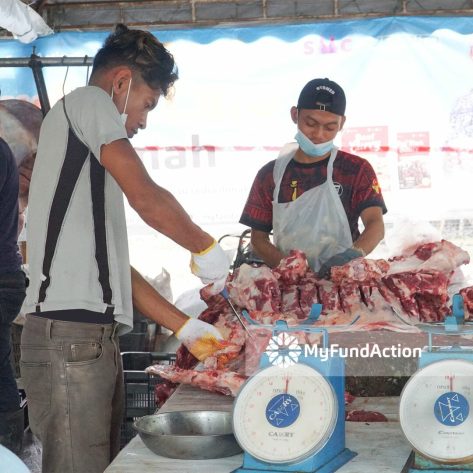
In the situation of our multi-ethnic society and religious beliefs, there is often a dispute regarding the distribution of qurban meat to non-Muslims, is this allowed by Islamic law or not?
Which animals are eligible for qurbani?
Before we jump to the hot topic, what animals exactly that are eligible for qurbani? The meat for Qurbani comes from an animal that must be sacrificed during the festival of Eid ul-Adha. The meat from each animal is apportioned into shares and the amount of shares per animal varies, as outlined below.
The sacrificed animal can either be:




If the Qurbani is a goat or sheep, this counts as a single share, meaning that an individual must purchase the animal solely in its entirety to perform their Qurbani. On the other hand, a camel, cow, bull, or buffalo has seven shares. This means that up to seven people can contribute towards the cost of the animal and receive their share in accordance with Qurbani meat distribution rules.
The animal can be male or female but should have no injuries, disabilities, or broken bones (including its horns). It should be sacrificed either immediately after Eid-ul-Adha prayers or as close to this time as possible.
Read More: Qurban: 3 Questions You Often Ask About It
Can qurban meat be given to your non-Muslim friends?
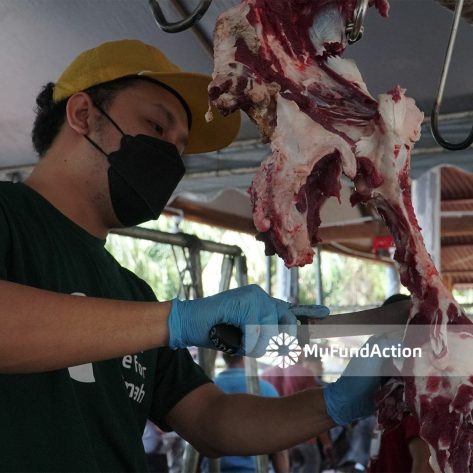
There is a difference of opinion among Islamic scholars about whether or not it is permissible to give qurban meat to non-Muslims. Some scholars believe that it is not permissible, as qurban is a religious act that is intended to be performed by Muslims. Others believe that it is permissible to give qurban meat to non-Muslims, as it is a way of showing kindness and compassion to others.
Arguments in favor of giving qurban meat to non-Muslims
First, it is a way of showing kindness and compassion to others. Islam teaches that we should be kind to all people, regardless of their religion.
Second, it is a way of spreading the message of Islam. When non-Muslims receive qurban meat, they may be curious about Islam and want to learn more about it.
Third, it is a way of building bridges between Muslims and non-Muslims. When we share our food with others, it helps to create a sense of community and understanding.
Arguments against giving qurban meat to non-Muslims
According to the final opinion in the Syafi’iy mazhab that we hold in Malaysia, it is unlawful to give qurban meat or to non -Muslims. This is because the worship of qurban is a Ta’abbudi form of worship that specializes its involvement to Muslims only such as Zakat.
Even so, according to Sahibus Samahah Mufti of the Federal Territory, Datuk Dr Zulkifli Al-Bakri, there are several other mazhab that require the giving of sacrificial meat to non-Muslims, as follows:
Al-Imam Abu Hanifah Rahimahullah gave rukhsah (reassurance) for the poor kafir to be given qurban meat to them. This is also the opinion of al-Hasan al-Basri Rahimahullah and also Abu Thaur Rahimahullah.
The Maliki argues that the law is makruh, such as feeding Jews or Christians.
The Hanbali holds that its law should be given to kafir from the sunnah qurban. Wajb qurban is not required.
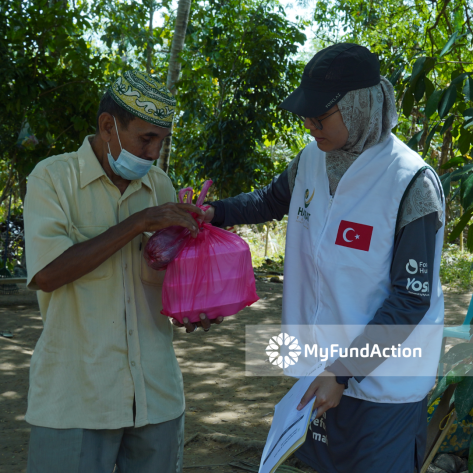
Although there are some opinions that allow the giving of qurban meat or aqiqah to non-Muslims, but this needs to be observed according to certain circumstances.
In practice, according to Ustaz Mohammad Hakimi Abdul Mutalib, the situation of sacrificial meat given to non-Muslims is when qurban is performed in the villages of new relatives from the Indigenous community. Such as the Murut tribe in Sabah, where a few family members closest to those who have not yet embraced Islam.
Qurban meat cook in a gotong-royong manner
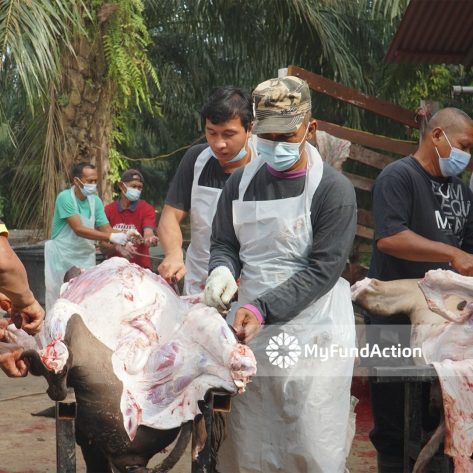
Usually, the qurban meat is not distributed as raw as distribution to Muslims but the meat will be cook in a gotong-royong manner to be served to the entire population. This is done so that they have the opportunity to approach and immerse themselves in the beauty of Islamic teachings that emphasize the concept of mercy to all human beings.
By doing this also can overcome any misunderstanding about the qurban itself. Therefore, we recommend that the performers and participants of the qurban consider the following solutions. So that this matter does not become a polemic that can affect the harmony of social life between Muslims and non-Muslims.
- Give a prudent explanation without any provocative element to non-Muslims to explain the rationale why the qurban meat is not shared with them.
- Carefully and prioritize the distribution of the meat to local Muslims first, especially from those who are less fortunate.
- Allocate some other meat in the form of hibah or gifts to be distributed to non-Muslims so that no prejudice or suspicion arises.
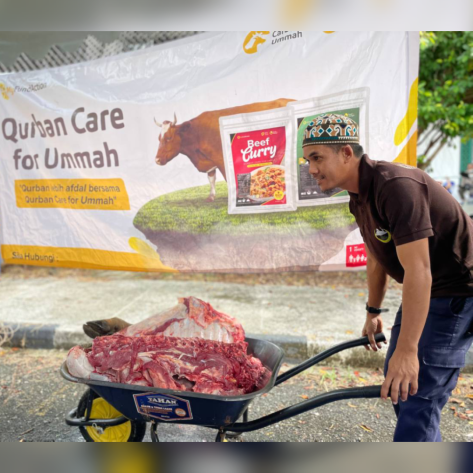
Qurban program goes innovative with Kongsi Daging project
As we approach the season of Qurban, many Muslims around the world are preparing to fulfill their religious obligation to sacrifice an animal and distribute the meat to the needy. In Malaysia, MyFundAction has been initiating the Qurban program every year to enable Muslims to perform their Qurban obligation in a convenient and efficient manner.
This year, MyFundAction is taking the Qurban program to a whole new level by introducing the Kongsi Daging project. This initiative is a great way to ensure that more people can participate in the Qurban program and have the opportunity to distribute the meat to the needy.
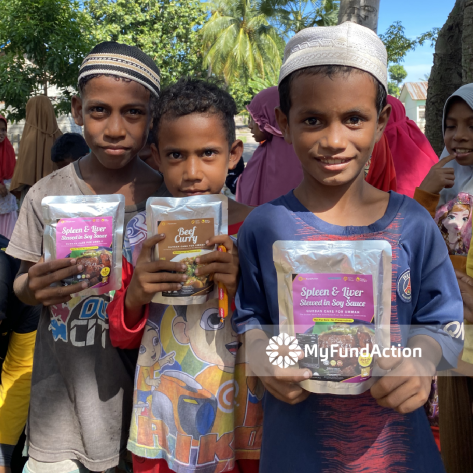
Benefit in joining Kongsi Daging project
We’ve been in charge of qurban for 8 years, and we were the first to use retort technology for qurban packs.
In situations where there is no access to clean water or cooking gas, the Ready To Eat packs provide a safe and hygienic source of food.
During emergencies, time is of the essence, and the Ready To Eat packs can be quickly prepared and delivered to those in need.
The Ready To Eat packs are designed to have a longer shelf life, which means that they can be stored for a longer period of time without spoiling. This helps to avoid food wastage, which is a major issue during disasters.
In conclusion, the Kongsi Daging project is a great initiative that allows more people to participate in the Qurban program, while the innovation of Ready To Eat packs offers a practical and efficient solution for emergency situations. By supporting this project, we can ensure that the meat from the Qurban is distributed to those in need, and help to make a positive impact on our community.

